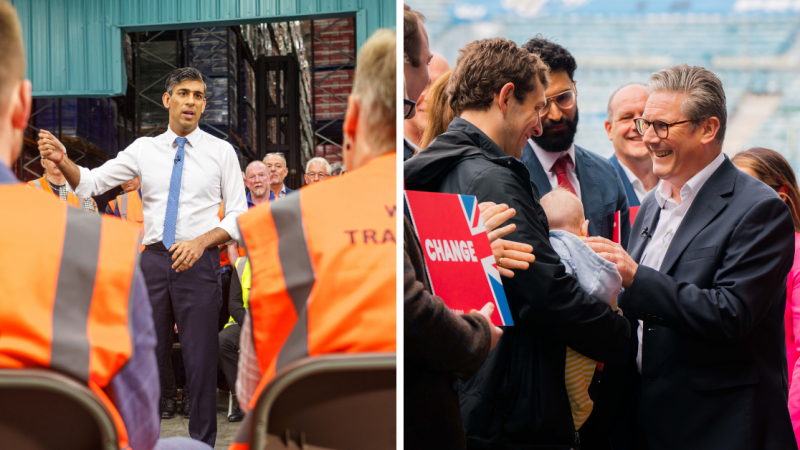UK
Workers Can’t Wait – Public Ownership Now!
We’re in the middle of the deepest cost-of-living crisis in generations, which has become a permanent cost-of-living emergency for millions. Yet the whole political establishment seems intent on never-ending austerity.
As a new Government approaches, we need to mobilise for policies that could address the depth of the crises we face, including the 10 Workers Can’t Wait demands. To help build this campaign initiative, we are publishing a daily blog on the importance on each of these demands. Today, Matt Willgress looks at why we need public ownership to stop the corporate rip-off.
Not a week goes by without more stories about the scandals and problems besetting Britain’s private water companies, most notably the possible collapse of Thames Water, which is in deep financial trouble, despite taking billions out of the company in loans and dividends.
Disgracefully, it was revealed at the end of last year that Thames Water had pumped at least 72 billion litres of sewage into the Thames since 2020.
As the pop star campaigner on this issue Feargal Sharkey has put it, “Every river in this country is polluted.” And it’s the profiteering private water companies who are to blame.
With Thames and the other water companies performing so abjectly, no wonder that – far from being a fringe demand – public ownership of water is supported by mainstream public position. 69% supported nationalisation of water when asked by both Survation in 2022 and YouGov is 2023, and this number is now only likely to be growing.
The case for it is crystal clear. Water is a natural monopoly, there is no market for consumers – and that is why 90% of the world runs water in public ownership, including Scotland, where Scottish Water was never privatised.
Globally, 311 cities and 36 countries brought water back into public hands between 2000 and 2019.
In the example of water – and many other examples of privatisation – we see private companies making obscene profits from what should be public services ran for the people not profit. These massive sums of money could instead be invested to improve services, to give their workers a pay increase and to lower costs for consumers. In other words, everyone would win other than the polluters and profiteers.
Water nationalisation was established Labour Party policy for a number of years. But just as the situation in the real-world in recent years has made the need for this even more obvious, the front bench has moved further away from it, citing a “constrained fiscal environment”.
And as readers will know, this is the case with other parts of the economy too, including energy, where the Party leadership has made clear its intention to ignore Party Conference policy. Again, this is not to do with popularity – 66% support public ownership of energy.
Public ownership in this area is again just common sense, with privatisation leading to higher bills and colder homes.
Over 3 million households in England are experiencing fuel poverty, with 50% of those surveyed stating that they had turned off heating when it was still cold in order to save money.
The crises caused by soaring energy bills and the scandal of raw sewage being dumped into rivers have highlighted the failures of privatisation for millions in a very real way. And they have come on top of the problems after problems caused by railway privatisation over recent years and decades.
They also give the perfect opportunity to make the case for a fresh start and put the public interest ahead of private profit.
As the ‘Workers Can’t Wait’ demand reads in full, it’s time to “Stop the corporate rip-off,” with “public ownership of energy, water, transport, broadband and mail to bring bills down, end fuel poverty and lower public transport costs.“
This should be accompanied by “higher taxes on profits and the super-rich,” and in order to really tackle the greedy profiteers, it’s tied to “open the books [and] back the workers’ commission on profiteering.”
But we should expect little from Starmer, Reeves and Co. On this score, it has been clear for some time that, whatever pledges were made when running for leader, the current leadership have consistently prioritised staying in the good books of those who have done well for themselves out of the current mess, ahead of advancing the change we need.
Indeed, the shifts of Labour’s front-bench can’t be separated from its overall project of making sure the party becomes the “first eleven” for the economic establishment.
But, after the Tories are thankfully kicked out and a Labour Government formed in July, we shouldn’t see the position of any government as something automatically fixed.
A strong labour movement rooted in our communities and taking the right initiatives can force real change. One step towards that is the building the ‘Workers Can’t Wait’ campaign, using this election and the period afterwards to raise the demands which could begin to address the scale of the crises austerity economics have created.

Workers can’t wait – Defend & extend our right to organise!
We’re in the middle of the deepest cost-of-living crisis in generations, which has become a permanent cost-of-living emergency for millions. Yet the whole political establishment seems intent on never-ending austerity.
As a new Government approaches, we need to mobilise for policies that could address the depth of the crises we face, including the 10 Workers Can’t Wait demands. To help build this campaign initiative, we are publishing a daily blog on the importance on each of these demands, with today Fraser McGuire looking at the need to “Defend and extend our right to organise.”
Our right to collectively organise has been decimated after 14 years of a malign Tory government which has worked tirelessly to attack the rights to take industrial action, organise in trade unions, and have the freedom of assembly and protest.
Unsatisfied with the effects of Thatcher’s assault on trade unions and workers, the last ten years have seen the government introduce of some of the most draconian laws designed to restrict the ability of workers to act and organise in the workplace. The Minimum Service Levels (MSL) Act undermines the democratic right of workers to take strike action, and the clearly politicised nature of the law can be seen in which sectors the government identified for MSLs to be implemented. The law would also put trade unions at risk of major claims for damages, following in the footsteps of the Thatcher government’s attempts to strip the assets and resources of the strongest trade unions.
Alongside the assault on our rights in the workplace, there has been a significant erosion of the right to freedom of assembly and the ability to protest the myriad of unjust laws passed in the last decade. As public anger swelled against austerity, the impacts of the cost-of-living crisis, and the British government’s complicity in the ongoing genocide in Gaza, police have been handed more powers to restrict protests and search, arrest, and fine individual protestors. The government’s own figures show that more than 650 protesters were arrested in 2023 under the new Public Order Act (2023).
In the past few weeks there have been increased arrests and physical attacks on students participating in peaceful protests and calling for universities to divest from arms companies complicit in the genocidal assault on Gaza. On the 23rd of May 16 student protestors were arrested at the University of Oxford, and on the 27th Greater Manchester Police attempted to use physical force to evict students from a university building- only being stopped by hundreds of protestors surrounding the building.
The crackdowns on our right to organise must be understood as the reaction of an increasingly politically isolated government faced with the threat of growing popular mobilisation against austerity policies, global injustice, and inequality, combined with the uptick in workers taking strike action and building the profile of the trade union movement. The Workers Can’t Wait petition is vital, and the need for mobilising workers and communities around the transformative policies we need to address the depth of the crises we face has never been greater.
We must also recognise that the fight doesn’t stop with the possibility of the Labour Party coming into government in July- already unions have raised concerns about the dilution of the ‘New Deal for Working People’ especially in regarding the clear lack of enthusiasm from shadow cabinet MPs in repealing Tory anti-union legislation. Any attempt to undermine the right to organise must be resisted. There is no mention in the Labour manifesto of repealing the wider restrictions on civil liberties that have been introduced in recent years, and Labour’s record on opposing these Government attacks has been weak.
Without the ability to collectively organise- in the streets, in our communities, and in the workplace- none of us are safe. The biggest victories for workers have never materialised out of thin air, they have been won through struggle and collective organising across every part of society.

Workers Can’t Wait – Britain needs a pay-rise now!
“We need to reverse the shift in our national income back towards people’s wages.”
We’re in the middle of the deepest cost-of-living crisis in generations, which has become a permanent cost-of-living emergency for millions. Yet the whole political establishment seems intent on never-ending austerity.
As a new Government approaches, we need to mobilise for policies that could address the depth of the crises we face, including the 10 Workers Can’t Wait demands. To help build this campaign initiative, we are publishing a daily blog on the importance on each of these demands. Today, Ben Folley looks at why “Britain needs a pay rise.”
The first demand of the Workers Can’t Wait petition is that Britain needs a pay rise with good reason.
TUC analysis has repeatedly shown more than a lost decade of pay stagnation with real wages below their pre-2008 financial crash level. Staggeringly, the average UK worker would be £10,400 a year better off now if wage growth had continued at pre-2008 levels. The Resolution Foundation backs this up – estimating the average worker would be £14,000 a year better off.
For fourteen years, the Tories have carried out an ideological agenda of aggressively cutting public sector pay in real terms and in the wider economy they have nurtured insecure work as part of ‘austerity’. Yet at the same time, a few at the top continue to make millions, with CEO salaries and bonuses continuing to rise far outstripping their workers’ pay deals.
This has been an unprecedented period in lost wages – but should be seen within the context of how over the past fifty years a growing share of our national income has been transferred from wages to capital – or from people’s pay to private profits over the past fifty years.
The scale of the drop off in pay has enormous consequences for people’s standard of living and our society as a whole. The numbers living in poverty have grown, and the level of poverty has deepened, with the majority in households where someone works. As well as real levels of pay being cut, the sharp climb in the use of zero hours contracts and the spread of increasingly precarious, insecure and ever more exploitative forms of work has left many workers without even a reliable or consistent level of pay to meet rent and bills.
Our sick pay is so low that during the pandemic it was directly linked to our high death toll as workers were left unable to afford to isolate, and so caught and spread the virus. Rather than learn that lesson it remains at just £116.75 a week.
Summer 2022 saw the start of a significant increase in working days lost to industrial action, over the subsequent twelve months, as many workers took action to try and turn around the long period of real pay cuts they had suffered, made more acute by surging inflation – particularly in energy and food bills.
The Tories countered the upsurge in industrial action with yet another attack on people’s collective trade union and individual employment rights with the Strikes (Minimum Service Levels) Act 2023, the purpose of which is to effectively take away people’s right to strike.
Scrapping the restrictive legislation on trade unions and strengthening people’s employment rights is urgently needed. This would help to ensure a floor of decent work, pay, terms and conditions for all of us and enable people to enforce their rights and to improve their working lives. Poverty pay and exploitative work is damaging our society. As Larry Elliott said recently, the fact that labour is so cheap discourages firms from investing and in developing the skills of their workers so that they are truly flexible rather than easily dispensable.
Properly funding better pay, and pay increases, across our public services has become not just an urgent matter of achieving decent living standards for these workers, but one of a recruitment and retention staffing crisis for services such as health, education and social services and care. Some left MPs have called for an inflation-proofed rise and a commitment to pay restoration over the next term of government. Despite that, there has been no commitment on pay restoration – even in principle – from the Labour frontbench, as Rachel Reeves sticks to her own fiscal rules that risk entrenching Tory austerity. The past fifty years has shown us it is not enough to just achieve economic growth – what matters is who benefits from that growth. We need to reverse the shift in our national income back towards people’s wages.
The Workers Can’t Wait campaign initiative is somewhere everyone can start. Sign it. Share it with friends. Take it to your local meeting. We need to raise its demands now and build, saying no to never-ending austerity.

Workers Can’t Wait – a right to food now!
We’re in the middle of the deepest cost-of-living crisis in generations, which has become a permanent cost-of-living emergency for millions. Yet the whole political establishment seems intent on never-ending austerity.
As a new Government approaches, we need to mobilise for policies that could address the depth of the crises we face, including the 10 ‘Workers Can’t Wait’ demands. To help build this campaign initiative, we are publishing a daily blog on the importance on each of these demands. Today, Ben Hayes looks at the demand “For the right to food.”
The combination of rising prices and incomes depleted by low pay and years of social security being undermined has had a disastrous impact in communities across the country. Food costs have proved a particularly devastating example of this. The Trussell Trust found that over 11 million adults in Britain had experienced food insecurity over 2022-23 (a period which saw prices reach their highest levels in four decades), with 47% of households affected also including children. This has left all too many people reliant on institutions such as food banks, held together by dedicated and often overstretched volunteers. The number of emergency food supply parcels distributed has more than tripled over the last 10 years.
Networks such as this have felt the impact of the cost-of-living crisis themselves, with many having to buy in supplies due to donations not keeping pace with rapidly increasing demand and/or extending hours so that the growing proportion of users of the service in paid employment can pick up parcels on their way to work. As the Trussell Trust itself acknowledges, Britain should be striving to eliminate the need for food banks entirely, rather than forcing their expansion as a response to a frightening rise in demand.
As well as the hard work of those seeking to help provide ways of addressing the shocking material impact of the situation in the here and now, we need a policy agenda which tackles the causes of it head on. Nobody in our society should be left worrying about whether or not they can meet one of the most basic human needs – especially in one of the world’s richest countries.
Right to Food (RTF) was launched in 2020 and emerged from the Fans Supporting Foodbanks initiative (a coalition of Everton and Liverpool supporters collecting donations at football matches in response to growing hunger in their local community), with MP for Liverpool West Derby Ian Byrne, himself a volunteer with this group, having championed the demands of the campaign in Parliament from day one. As well as enshrining a legal right to food provision, the measures proposed by RTF include universal free school meals, for government to explicitly state the proportion of income expected to be spent on food when setting the minimum wage and social security levels, the creation of Community Kitchens, and independent bodies to hold government to account on this issue.
The level of support the campaign has received is reflective both of the scale of the crisis it was set up in response to and the resonance of its programme, with MPs from various parties, trade unions and faith groups among those offering their support. Numerous bodies in local and devolved government have also begun taking up this agenda, with Mayor of London Sadiq Khan committing to continuing the policy of providing free meals to all primary school children in the capital as part of his successful re-election campaign last month. Both the city councils and Combined Authorities in Liverpool and Manchester have voted to become ‘Right to Food cities’, joining administrations including Rotherham, Brighton and Hove, St Helens, Preston, Lancaster, Durham, Newcastle, Portsmouth, Totnes, Coventry, Sheffield, Birmingham, Haringey, Brent, Lewisham, Lambeth, Hackney, Southwark, Islington, Cumberland and Southampton.
There is also potential for an alliance with public health campaigners over ensuring access to nutritious meals (with The Food Foundation finding that anyone in the most deprived fifth of the population would need need to spend half of their disposable income on food in order to meet the cost of a government-recommended healthy diet), as well as workers in the food industry: RTF was included as one of the demands of the Bakers, Food and Allied Workers Union’s ‘Bakers’ Dozen’ manifesto.
It can undoubtedly be frustrating seeing how little the seriousness of this issue is being reflected in coverage around the upcoming general election. A question in the first televised leaders’ debate from audience member Paula, who discussed having started to cook multiple meals at once over fears about the costs of using her oven, provided a much-needed reminder of the reality for significant numbers of people in Britain today. Indeed, the Prime Minister acknowledged that “There’ll be millions of people watching this who feel in a similar position to you”: but regrettably, responses from both leaders were somewhat lighter on substantive plans to address situations like Paula’s than rehearsed soundbites shoehorned in.
However, a period where millions are more engaged with political debate than usual and prominent figures are subject to greater scrutiny is still an opportunity to build up pressure for change. The Labour Assembly Against Austerity has taken up the Right to Food in its ‘Workers Can’t Wait’ statement, which puts forward an agenda to tackle the cost-of living crisis- with the relevant section echoing calls to enshrine access to food as a legal right, the introduction of universal free school meals nationally and the creation of a National Food Service. The measures put forward on other areas (such as including strengthening wages, ending reactionary policies in relation to social security, implementing price controls and ensuring trade union freedom) are also important to addressing the relentless squeeze on living standards which is at the heart of hunger in Britain- with over 22,000 people now having signed up. It’s vital that we keep up the momentum and build support for this in the labour movement and beyond.
- You can find the Worker’s Can’t Wait demands – and join over 22,000 in adding your support here.
- We’re publishing a series of articles for each of the Workers Can’t Wait demands, you can find them as they are published here.








